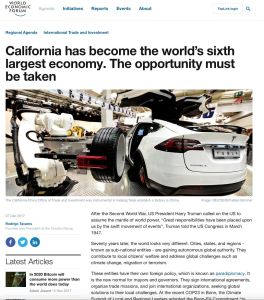Join getAbstract to access the summary!

Join getAbstract to access the summary!
Rodrigo Tavares
California has become the world’s sixth largest economy. The opportunity must be taken
World Economic Forum, 2017
What's inside?
California can do a better job of flexing its economic and policy muscles around the world.
Recommendation
California – long known for its movie production, rich agriculture and dazzling coastline – also wears the mantle of the world’s sixth biggest economy. Yet despite its economic clout, the state falls short when it comes to promoting global trade and forging agreements with foreign governments that could benefit its citizens. Consultant and investment banker Rodrigo Tavares takes a critical look at the problem and suggests general solutions that government officials in California and other regions could implement. getAbstract recommends this eye-opening article to state and local authorities interested in extending their international reach and influencing global policy.
Summary
About the Author
Rodrigo Tavares is founder and president of the Granito Group.


















Comment on this summary